


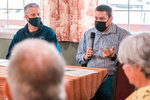

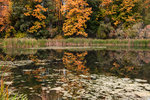
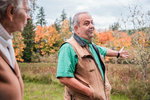
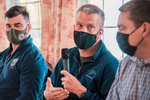
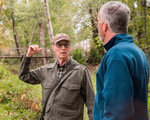

When Ryderwood’s general store burned down in 1997, the town’s elderly residents took it upon themselves to rebuild it from scratch, turning it into a nonprofit cafe run entirely by volunteers.
That’s just how Ryderwood, a retirement community located 6 miles southeast of Vader in Cowlitz County, works. With only three paid employees in a town of 503 people, the residents take care of each other and the town’s resources, and they pride themselves in their volunteerism.
So when it became clear that the town’s lake was suffering from sedimentation and overgrown vegetation, residents wanted to clean the lake themselves.
But to do that, they need permits and permission from state agencies — a process the town’s residents are already frustrated with.
“This little town is usually pretty immaculate because of people volunteering. They’re dying to get to that pond and clean it up and they would do it in a safe and effective way, but unfortunately because of fish and game laws and this and that, we’re not even allowed to touch what I consider our own property,” said Ryderwood resident Linda Munson at an Oct. 21 meeting with Ryderwood stakeholders, including Cowlitz County officials, foresters with nearby landowner Sierra Pacific Industries and a Department of Natural Resources (DNR) representative, to discuss how to initiate a project intended to return the lake to its former glory.
Ryderwood’s management, the Ryderwood Improvement and Service Association (RISA), is seeking permission and resources to dredge the southern portion of the lake and to reduce future sedimentation by rerouting nearby Campbell Creek into the lake.
The townspeople created Ryderwood Lake, also known as Ryderwood Pond, in 1956 after receiving permission from the state to construct a dam on nearby Dixon Creek with the intent of turning a gravel pit in town into a fishing lake for Ryderwood’s residents.
At its prime, Ryderwood Pond was 6 acres in size with depths ranging from 7 feet deep on one end to 4 feet deep on the other.
A floating boathouse in the north end allowed residents to take rowboats out onto the lake, and many use the lake as a fishing spot.
But over the years, sedimentation and overgrown vegetation have overtaken much of the lake.
“I like to fish, that’s one of the reasons why I moved out here,” said Munson, “and every place that I went out to on that pond, my line was less than 3 feet in the water and I came out with nothing but sludge.”
Residents do still use the beloved lake as a recreation site. Bill Greear, one of Ryderwood’s few lifelong residents, said he still takes his kayak out into the deeper sections of the lake, and many residents frequent a walking trail around the lake and attempt to fish.
But many are frustrated as they watch the lake become increasingly shallow and overgrown without the ability to do anything about it.
“This is nature’s beauty, but unfortunately it's got a bit of a blemish,” said Munson.
Aside from the diminished scenic and recreational value of the lake, the residents are concerned that the lower water levels would hinder firefighting efforts in the event of a major forest fire.
“What the lake would be useful for is in a wild forest fire sort of situation,” said Patrick Harbison, utilities manager for Cowlitz County, who was asked to speak at the Oct. 21 meeting.
“If a forest fire shows up, opening up hydrants with hoses is only going to last hours. It’s going to protect the town long enough to get you out of town. The residents are requesting enough access to the lake to actually try and protect the town so they don’t become Paradise California.”
Paradise, a rural foothill town in Northern California, was virtually destroyed in the Camp Fire in 2018.
While there admittedly isn’t much water in Ryderwood Lake, Jeff Bortner, the fire operations district manager for DNR’s Pacific Cascade Region, told Ryderwood residents that firefighters are able to work with much less.
“The lake as it currently is, we could utilize it,” said Bortner. “If it's a drought year and we have to go somewhere else for water, we will; but we’re pretty good at finding water when we need it.”
DNR is able to transport water via tenders if needed, but Bortner said natural water sources are pretty easy to find in Southwestern Washington.
“There’s normally some water somewhere, and we’re very good at going to fires in places that have much less water and finding it too, somehow, whether it's trucking it in from the nearest hydrant or finding a lake, pond or a river. We do that quite often,” said Bortner.
Even so, Ryderwood’s residents are determined to clean and restore the lake.
“The big concern right now is the water. We’ve got to have that water,” said Munson. “We know for a fact that water is not very deep anymore and that has got to be cleaned up. We would do it ourselves if somebody would just let us have the equipment.”
Harbison said he sympathized with the residents’ frustration with the permitting process.
“Unfortunately, it's a fact of life for us in Washington,” he said. “If the county could give you permission to get in there, I almost guarantee they would, but it's really the state agencies that permission would need to come down from.”
The first step in that project would be to do a feasibility study to determine what permits would be needed and how much each part of the project would cost. But a feasibility study takes time and money that neither Ryderwood or Cowlitz County have right now.
“It’s not a short process and it's not a cheap process, that’s the problem as I see it,” said Harbison.
Until the town can secure a state agency or another organization to serve as a project manager, it’s RISA’s responsibility to seek funding and complete a feasibility study.
Cowlitz County Commissioner Arne Mortenson recommended that the town make a firm decision on its priorities regarding the lake and build a plan from there.
“You can imagine you’re not the only community to say we need help,” said Mortenson, “You’ve got to decide what is important to you … I’ve heard you want it all, and that is really hard to do.”
While Cowlitz County has not agreed to manage the project, Harbison said he would speak to his supervisor and come up with ideas for other options RISA can pursue to get their project moving.
“Cowlitz County at this second is not in the position to manage it but there are options that I’ve seen small organizations do to manage something similar to this and we can go from there,” said Harbison.